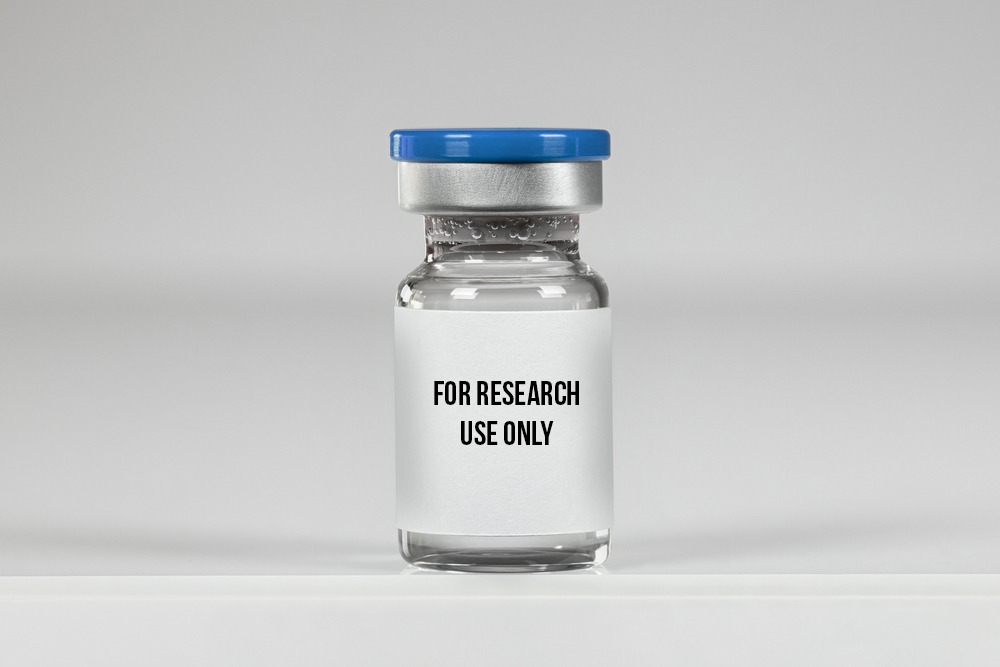Some companies sell products that at first glance appear to be dietary supplements, but the labelling or advertising says, “not for human consumption,” “not for human use,” or “for research purposes only.” These companies may have a history of selling dietary supplements spiked with performance-enhancing drugs, and to avoid scrutiny by the FDA, they may eventually change their labels to read “research chemical.” Continue reading to learn more about why athletes should avoid these products.
What are research chemicals or products advertised as “not for human consumption”?
 There are a lot of companies that sell peptides, SARMs, or unapproved experimental drugs direct to consumers and call them “research chemicals” or put disclaimers such as “for research purposes only” or “not for human consumption.” Sometimes these products resemble medications because they are designed to be injected, or they are purchased from online “pharmacies” or in compounding pharmacies, or they are prescribed by a health practitioner.
There are a lot of companies that sell peptides, SARMs, or unapproved experimental drugs direct to consumers and call them “research chemicals” or put disclaimers such as “for research purposes only” or “not for human consumption.” Sometimes these products resemble medications because they are designed to be injected, or they are purchased from online “pharmacies” or in compounding pharmacies, or they are prescribed by a health practitioner.
In other cases, these products resemble dietary supplements because they are sold in similar bottles, have similar forms such as capsules, tablets, and powders, are formulated in similar doses, and have similar labeling and art. Often, the only difference is that, instead of a “Supplement Facts” panel on the back (as is legally required for dietary supplements), there is a “Research Facts” panel, or the ingredient information might be missing altogether. Many of these products contain illegal, unapproved performance-enhancing drugs that are illegal in dietary supplements. Athletes should avoid any product that has warnings such as “for research purposes only.”
Are products labelled as “research chemicals” legal?
It’s complicated. Most laws relate to how a product is advertised and distributed. But if a product is intended for human consumption (even if it has disclaimers that say “NOT for human consumption”) and it contains an unapproved drug, then the FDA could determine the manufacturer is breaking the law. The FDA has several ways to determine if a product is intended for human consumption or if it is intended to treat a disease or alter the structure or function of the body.
One very common strategy for companies selling products marketed as research chemicals is to have a website with general information about a substance, and then another part of the website selling products that contain that substance. For example, a website might have information about a particular SARM, explaining “this SARM improves muscle recovery” and it “has all the benefits of testosterone injections without all the risks” and it “Reduces androgenic effects on the prostate to cut the risk of growth of prostate cancer.” After reading this general information about the SARM, the company hopes the consumer will conclude they want to buy a product with this ingredient in it. Then, on another page of the website, the company will sell products that contain the SARM in dosages designed for human use (such as oral capsules). This is where the sales page will have disclaimers such as “research chemical” or “Not for human consumption.”
However, a recent FDA warning letter shows that claims like “for research purposes only” do not absolve the company from responsibility. In a recent warning letter, the FDA confronted a company for selling unapproved drugs under the guise of “research chemicals.” The warning letter clarifies that the FDA considers “research chemicals” to be unapproved new drugs when it’s clear the company knows that people will be buying the product and using it. The FDA cited all of the education claims made about the general ingredients (in this case, mostly SARMs) as proof that the company intended for people to buy the product to use on themselves.
If research chemicals are prescribed by a doctor at a health clinic, are they O.K. to use?
Not necessarily. USADA has found many products offered by health practitioners in health clinics that are similar to products that the FDA has publicly declared illegal, and that contain substances prohibited in sport.
Are research chemicals prohibited in sport?
The World Anti-Doping Agency does not prohibit categories of products. Athletes must check the status of each ingredient or substance on GlobalDRO.com to determine the anti-doping status. If a prohibited substance is listed on the label, the athlete should consider the product prohibited in sport. However, USADA recommends athletes avoid any product marketed or labelled as a research chemical even if it doesn’t list a prohibited substance. These products have not been reviewed or tested for product quality, efficacy, or safety, and may carry the risk of a positive anti-doping test and/or adverse health event.
More questions?
For questions about specific products, substances, and methods, contact USADA’s Drug Reference Line at drugreference@USADA.org or call (719) 785-2000 and follow the prompts. There is also a TUE Pre-Check Form that athletes can submit to get a quick response on whether a TUE is necessary.
More education?
In addition to educating athletes and offering real-time support, USADA offers resources and tutorials for athlete support personnel, including health professionals and coaches.
- HealthPro Advantage (free and in collaboration with Stanford University)
- Coach’s Advantage
Read more Spirit of Sport blog posts



